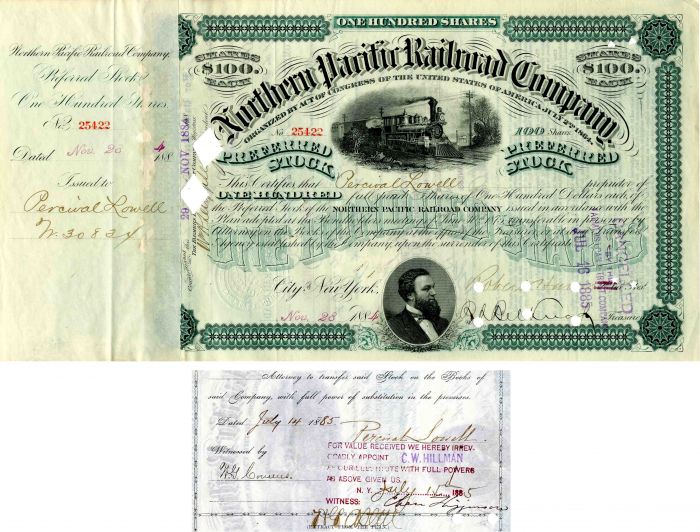Northern Pacific Railroad Co. Issued to and Signed by Percival Lowell - Stock Certificate
Inv# AG2339 Stock

Percival Lawrence Lowell (/ˈloʊəl/; March 13, 1855 – November 12, 1916) was an American businessman, author, mathematician, and astronomer who fueled speculation that there were canals on Mars. He founded the Lowell Observatory in Flagstaff, Arizona, and formed the beginning of the effort that led to the discovery of Pluto 14 years after his death.
Percival Lowell was born on March 13, 1855, in Boston, Massachusetts, the first son of Augustus Lowell and Katherine Bigelow Lowell. A member of the Brahmin Lowell family, his siblings included the poet Amy Lowell, the educator and legal scholar Abbott Lawrence Lowell, and Elizabeth Lowell Putnam, an early activist for prenatal care. They were the great-grandchildren of John Lowell and, on their mother's side, the grandchildren of Abbott Lawrence.
Percival graduated from the Noble and Greenough School in 1872 and Harvard University in 1876 with distinction in mathematics. At his college graduation, he gave a speech, considered very advanced for its time, on the nebular hypothesis. He was later awarded honorary degrees from Amherst College and Clark University. After graduation he ran a cotton mill for six years.
In the 1880s, Lowell traveled extensively in the Far East. In August 1883, he served as a foreign secretary and counselor for a special Korean diplomatic mission to the United States. He lived in Korea for about two months. He also spent significant periods of time in Japan, writing books on Japanese religion, psychology, and behavior. His texts are filled with observations and academic discussions of various aspects of Japanese life, including language, religious practices, economics, travel in Japan, and the development of personality.
Books by Lowell on the Orient include Noto: An Unexplored Corner of Japan (1891) and Occult Japan, or the Way of the Gods (1894), the latter from his third and final trip to the region. His time in Korea inspired Chosön: The Land of the Morning Calm (1886, Boston). The most popular of Lowell's books on the Orient, The Soul of the Far East (1888), contains an early synthesis of some of his ideas that, in essence, postulated that human progress is a function of the qualities of individuality and imagination. The writer Lafcadio Hearn called it a "colossal, splendid, godlike book." At his death he left with his assistant Wrexie Leonard an unpublished manuscript of a book entitled Peaks and Plateaux in the Effect on Tree Life.
Lowell was elected a Fellow of the American Academy of Arts and Sciences in 1892. He moved back to the United States in 1893. He became determined to study Mars and astronomy as a full-time career after reading Camille Flammarion's La planète Mars. He was particularly interested in the canals of Mars, as drawn by Italian astronomer Giovanni Schiaparelli, who was director of the Milan Observatory. Beginning in the winter of 1893–94, using his wealth and influence, Lowell dedicated himself to the study of astronomy, founding the observatory which bears his name. He chose Flagstaff, Arizona Territory, as the home of his new observatory. At an altitude of over 2,100 meters (6,900 feet), with few cloudy nights, and far from city lights, Flagstaff was an excellent site for astronomical observations. This marked the first time an observatory had been deliberately located in a remote, elevated place for optimal seeing.
In 1904, Lowell received the Prix Jules Janssen, the highest award of the Société astronomique de France, the French astronomical society. For the last 23 years of his life, astronomy, Lowell Observatory, and his and others' work at his observatory were the focal points of his life.
World War I very much saddened Lowell, a dedicated pacifist. This, along with some setbacks in his astronomical work (described below), undermined his health and contributed to his death from a stroke on November 12, 1916, aged 61. Lowell is buried on Mars Hill near his observatory. Lowell claimed to "stick to the church" though at least one current author describes him as an agnostic.
A stock certificate is issued by businesses, usually companies. A stock is part of the permanent finance of a business. Normally, they are never repaid, and the investor can recover his/her money only by selling to another investor. Most stocks, or also called shares, earn dividends, at the business's discretion, depending on how well it has traded. A stockholder or shareholder is a part-owner of the business that issued the stock certificates.









Ebay ID: labarre_galleries